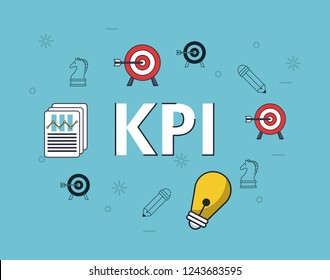
Unlocking Success: The Power of Key Performance Indicators
In today’s fast-paced business world, staying ahead of the competition requires more than just intuition and guesswork. Companies are constantly seeking ways to measure their progress, identify areas for improvement, and make informed decisions to drive success. This is where Key Performance Indicators (KPIs) come into play. These powerful tools provide a clear and objective way to assess the performance and effectiveness of various aspects of an organization.
At its core, a Key Performance Indicator is a measurable value that demonstrates how effectively a company is achieving its key objectives. These objectives can vary across industries and organizations, but they all share a common purpose: to track progress towards desired outcomes. By having well-defined KPIs in place, businesses can effectively gauge their performance, identify trends, and make data-driven decisions, leading to improved overall efficiency and profitability.
https://www.intrafocus.com/kpi-software/
One of the significant advantages of KPIs is their ability to provide a holistic view of the organization’s performance. Rather than relying solely on financial metrics, KPIs encompass a wide range of areas, including customer satisfaction, employee productivity, operational efficiency, and more. This comprehensive approach allows businesses to gain valuable insights into various facets of their operations and identify potential areas for improvement.
Moreover, KPIs encourage a culture of accountability and transparency within an organization. By regularly monitoring and sharing KPI data with relevant stakeholders, teams are held responsible for their performance and can work collectively towards achieving their targets. This not only fosters a sense of unity but also promotes a proactive approach to problem-solving, as potential issues can be identified and addressed in a timely manner.
In conclusion, Key Performance Indicators serve as a vital compass for organizations navigating the complex realm of business. By leveraging these measurable indicators, companies can unlock the formula for success, driving continuous improvement through data-backed decision making. Through the power of KPIs, businesses can align their efforts, optimize performance, and ultimately achieve their strategic goals.
Understanding Key Performance Indicators
Key Performance Indicators, commonly known as KPIs, play a crucial role in measuring and evaluating the progress and success of organizations. By providing valuable insights into various aspects of performance, KPIs serve as essential tools for businesses to make data-driven decisions and drive growth. These indicators are carefully selected based on specific goals and objectives, allowing organizations to assess their performance effectively.
When it comes to understanding Key Performance Indicators, it is important to recognize that they vary across industries and sectors. Each organization defines its unique set of KPIs, tailored to its specific needs and priorities. These indicators could range from financial metrics, such as revenue and profit margins, to operational metrics, such as customer satisfaction and employee productivity. By choosing the right KPIs, companies gain visibility into the areas that truly matter and can identify where improvements are needed.
Key Performance Indicators are not just mere numbers or statistics; they provide valuable insights and act as a compass guiding businesses towards success. KPIs enable organizations to set clear targets and monitor progress towards achieving them. By analyzing and interpreting KPI data, companies gain a deeper understanding of their strengths and weaknesses, allowing them to make informed decisions and take appropriate actions. Ultimately, KPIs help organizations stay on track and continuously improve their performance.
In conclusion, Key Performance Indicators are vital tools for organizations seeking success in today’s competitive landscape. By understanding their significance and effectively implementing them, businesses gain valuable insights into their performance, identify areas for improvement, and strive towards achieving their goals. Harnessing the power of KPIs empowers organizations to make data-driven decisions and unlock their true potential.
Implementing Effective KPIs
When it comes to implementing effective Key Performance Indicators (KPIs) in an organization, it’s crucial to have a strategic approach. By understanding the specific objectives and goals of the company, KPIs can be selected and utilized to track progress and drive success. Here are some key considerations for implementing effective KPIs.
Firstly, it’s important to clearly define the desired outcomes and success metrics. This involves understanding what matters most to the organization and determining the relevant KPIs that align with those priorities. By setting clear and specific targets, it becomes easier to track progress and make informed decisions based on the results.
Secondly, it’s essential to involve all relevant stakeholders in the KPI selection process. This ensures that different perspectives and expertise contribute to the decision-making, making the KPIs more comprehensive and reflective of the organization’s overall objectives. By fostering collaboration and obtaining buy-in from stakeholders, the likelihood of successful implementation is increased.
Lastly, regular monitoring and analysis of the selected KPIs are vital for successful implementation. By using data-driven insights, organizations can gain a deeper understanding of their performance and identify areas for improvement. Ongoing monitoring also enables timely adjustments to be made, ensuring that the KPIs remain relevant and effective in driving success.
In conclusion, implementing effective KPIs requires a strategic approach that includes setting clear objectives, involving stakeholders, and regular monitoring and analysis. By following these steps, organizations can unlock the power of Key Performance Indicators and drive success in their operations.
Leveraging KPIs for Success
In today’s fast-paced business landscape, leveraging Key Performance Indicators (KPIs) has become essential for achieving success. KPIs provide valuable insights into the performance of various business functions, allowing organizations to make informed decisions and drive strategic initiatives.
One key way to leverage KPIs for success is by setting clear and measurable goals. By identifying specific objectives and aligning them with relevant KPIs, businesses can track their progress and make necessary adjustments along the way. This enables them to stay focused and ensure that every action taken contributes towards their overall success.
Another important aspect of leveraging KPIs is regular monitoring and analysis. By reviewing KPI data on a consistent basis, businesses can identify trends, patterns, and areas for improvement. This allows them to be proactive in addressing challenges and maximizing opportunities, leading to continuous growth and success.
Additionally, communicating KPIs effectively across the organization is crucial. When employees understand the relevance and significance of the KPIs they are responsible for, they can align their efforts accordingly. This fosters a culture of accountability and drives individual and collective performance towards achieving organizational goals.
In conclusion, the power of Key Performance Indicators in unlocking success cannot be underestimated. By leveraging KPIs to set goals, monitor progress, and communicate effectively, businesses can drive performance, make informed decisions, and ultimately achieve their desired level of success.






